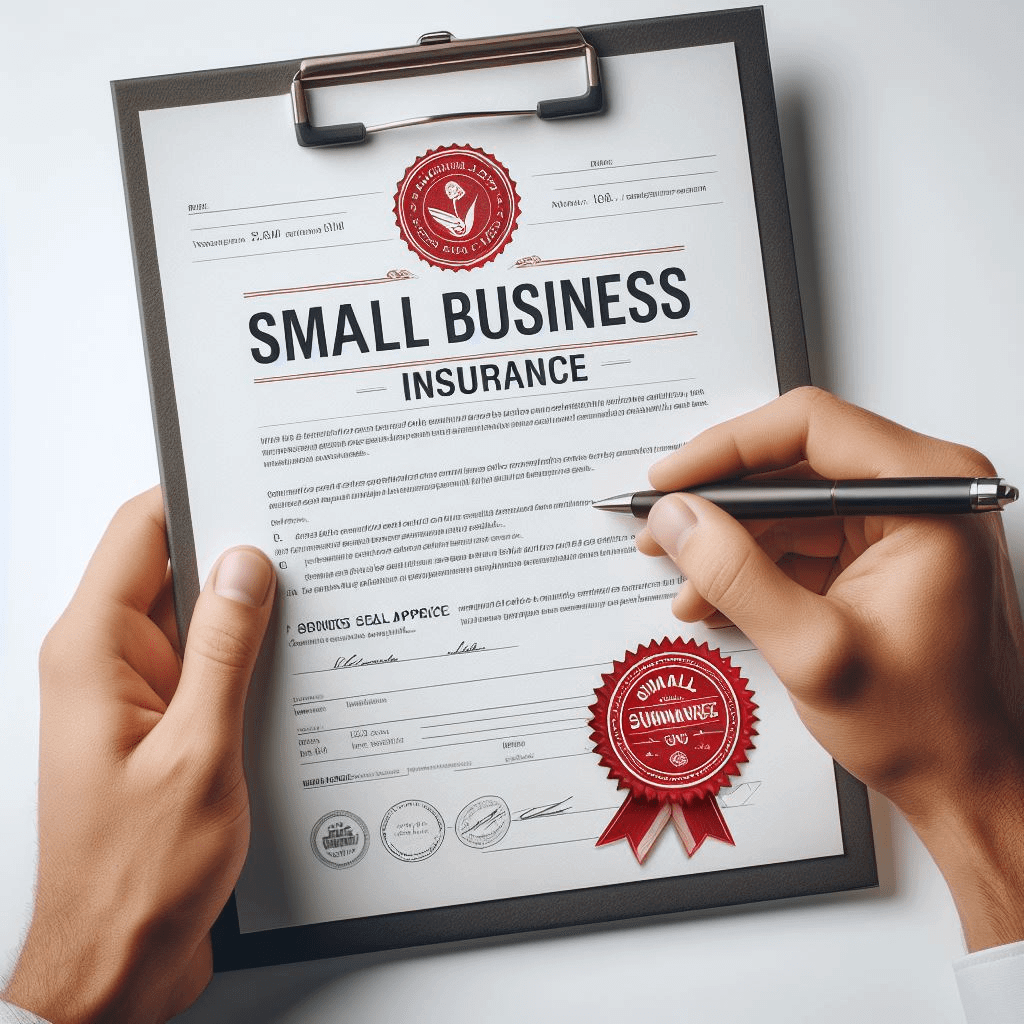Introduction
In the ever-changing landscape of modern business, entrepreneurs and small business owners face numerous challenges and uncertainties. From managing day-to-day operations to planning for long-term growth, the myriad responsibilities can be overwhelming. Amidst these challenges, one critical tool stands out as essential for the survival and success of any business: insurance.
Insurance acts as a safety net, shielding businesses from unexpected events that could otherwise jeopardize their operations. This article delves into the importance of insurance for small businesses, exploring the key reasons why it is indispensable, the types of coverage every small business should consider, and how insurance can ultimately provide peace of mind and stability for business owners.
Understanding the Need for Business Insurance

If you’ve ever asked yourself, “Why do businesses need insurance?” the answer is simple: because accidents, disasters, and unexpected events can happen at any time. When they do, business insurance helps cover the costs, protecting from financial losses that could be devastating without the right coverage.
Insurance is more than just a regulatory requirement or a checkbox on your business plan. It’s an investment in the security of your business, your employees, and your future. Here’s a closer look at the top reasons why business insurance is essential:
Protection of Assets and Property
Every small business relies on its assets—whether it’s a physical storefront, inventory, equipment, or intellectual property. Comprehensive insurance policies safeguard these valuable resources against risks such as fire, theft, vandalism, and natural disasters. Without insurance, replacing these assets could be financially crippling, potentially leading to the closure of your business.
For instance, if a fire destroys your building and inventory, property insurance can help cover the costs of repairs or replacements. This protection ensures that your business can recover quickly and continue operations without a significant financial setback.
Liability Coverage
Liability is one of the most significant risks faced by small businesses. Whether it’s a slip-and-fall accident on your premises, a defective product, or a breach of contract, liability claims can result in substantial legal fees, settlements, and damages. General liability insurance mitigates these financial burdens, covering legal defense costs and any settlements or judgments against your business.
For example, if a customer slips, breaks their leg, and needs medical attention, your general liability insurance can help pay for their medical expenses and any legal fees if they decide to sue. This coverage is crucial for protecting your business from potentially ruinous legal battles.
Employee Protection
Your employees are your most valuable asset, and protecting them should be a top priority. Workers’ compensation insurance provides financial support for employees who suffer work-related injuries or illnesses. It covers medical expenses, lost wages, and even funeral costs in the event of a workplace accident.
In addition to being a legal requirement in most states, offering workers’ compensation insurance demonstrates your commitment to employee welfare. It also protects your business from lawsuits related to workplace injuries, as workers’ compensation generally provides an exclusive remedy, meaning employees cannot sue their employer for work-related injuries if they are receiving workers’ comp benefits.
Business Interruption Coverage
Natural disasters, fires, or other unforeseen events can disrupt your business operations, leading to a loss of income. Business interruption insurance, also known as business income insurance, compensates for lost income, ongoing expenses, and temporary relocation costs during such disruptions.
For instance, if a hurricane damages your storefront and you need to close for repairs, business interruption insurance can help cover the income you would have earned during the closure. This coverage ensures that your business can survive even when operations are halted, providing a financial cushion until you can resume normal activities.
Cybersecurity and Data Breach Protection
In today’s digital age, cybersecurity is a growing concern for businesses of all sizes. A data breach or cyberattack can lead to significant financial losses, legal liabilities, and damage to your business’s reputation. Cyber liability insurance helps protect your business from the financial repercussions of data breaches, covering costs such as legal fees, customer notification expenses, and credit monitoring services.
For online businesses, this type of insurance is particularly critical. If a hacker steals your customers’ personal information, cyber liability insurance can help you manage the fallout, including public relations efforts to restore your brand’s reputation.
A Closer Look at the Top Reasons Why You Need Insurance For Your Business

Having discussed the fundamental types of insurance coverage, let’s explore in more detail the top ten reasons why insurance is essential for your small business:
Legal Compliance
In many jurisdictions, certain types of business insurance are legally required. For example, most states mandate workers’ compensation insurance if you have employees. Failing to comply with these legal requirements can result in fines, penalties, and even the forced closure of your business. Moreover, being insured demonstrates that you are operating a responsible and legitimate business.
Even if your state or local laws don’t require specific insurance, it’s still a wise decision to obtain coverage to protect against potential risks and liabilities.
Building Credibility and Trust
Having the appropriate insurance coverage enhances your business’s credibility and reputation. It signals to customers, partners, and clients that you are committed to managing risks effectively and are prepared to handle unforeseen events. This can be particularly important when entering into contracts, as many agreements require proof of insurance before business can commence.
For example, if you’re renting a commercial space or securing a loan, your landlord or lender will likely require you to carry insurance. Similarly, client agreements often stipulate that you must have liability insurance to cover any potential damages or claims.
Attracting and Retaining Talent
In today’s competitive job market, employees are looking for more than just a paycheck—they want a comprehensive benefits package. Offering insurance coverage, such as health and life insurance, can help attract and retain top talent. It also contributes to a positive work environment, where employees feel valued and secure.
Businesses without insurance coverage may struggle to compete for the best employees, as job seekers increasingly prioritize employers who offer robust benefits.
Protection Against Product and Service Risks
Product liability insurance is crucial for businesses that manufacture, distribute, or sell products. It protects against legal claims arising from harm or dissatisfaction with your products. Whether it’s a design flaw, manufacturing defect, or inadequate warning label, product liability insurance can cover legal defense costs, settlements, and damages.
Service-based businesses also benefit from professional liability insurance (also known as errors and omissions insurance), which covers claims related to mistakes, negligence, or inadequate work. This type of coverage is essential for professionals such as consultants, accountants, and IT specialists.
Natural Disaster Protection
Natural disasters can strike without warning, causing significant damage to your business premises and assets. Whether it’s flooding, fires, tornadoes, hurricanes, or lightning, having the right insurance is critical for protecting your business. Property insurance can help cover the costs of repairs or replacements, ensuring that your business can recover and continue operations.
In areas prone to specific natural disasters, additional coverage, such as flood insurance, may be necessary to fully protect your business.
Protection Against Lawsuits
Every business, regardless of size or industry, is at risk of being sued. Legal fees, settlements, and court judgments can be financially devastating, especially for small businesses with limited resources. Liability insurance, including general and professional liability coverage, helps cover these costs, protecting your business from potential ruin.
For example, if a former employee sues your business for wrongful termination, your liability insurance can help cover legal fees and any settlement or judgment awarded to the plaintiff.
Contractual Obligations
Many business contracts require insurance protection. Whether you’re renting a building, securing a loan, or entering into a client agreement, you may be required to provide proof of insurance. Fulfilling these contractual obligations is essential for maintaining business relationships and avoiding potential legal disputes.
Failure to meet insurance requirements could result in breach of contract, leading to financial penalties or termination of the agreement.
Financial Stability and Peace of Mind
One of the most significant benefits of business insurance is the peace of mind it provides. Knowing that your business is protected from various risks allows you to focus on growth and operations without constantly worrying about potential setbacks. Insurance provides financial stability, ensuring that your business can weather challenges and continue thriving.
This peace of mind is invaluable, as it allows you to concentrate on what matters most: running your business and serving your customers.
Support During Business Interruptions
As mentioned earlier, business interruption insurance is crucial for protecting your income and covering ongoing expenses during periods of disruption. Whether it’s due to a natural disaster, a fire, or another unforeseen event, this coverage ensures that your business can survive even when operations are temporarily halted.
By providing a financial cushion during difficult times, business interruption insurance allows you to focus on recovery and resuming normal operations as quickly as possible.
Protection for Management and Key Personnel
Management liability insurance, also known as directors and officers (D&O) insurance, provides coverage for the key individuals who run your business, such as the owner, CEO, or other executives. This type of insurance protects against legal claims related to their decisions and actions, which could otherwise result in significant financial losses for the business.
For nonprofit organizations and publicly traded companies, management liability insurance is particularly important, as these entities face higher levels of scrutiny and legal exposure.
Choosing the Right Insurance Coverage for Your Small Business
Now that we’ve explored the importance of insurance for small businesses, it’s crucial to understand which types of coverage are necessary for your specific needs. Here are some of the most common types of insurance that small businesses should consider:
Commercial Property Insurance
This coverage protects your business’s physical assets, including buildings, equipment, inventory, and furniture, from risks such as fire, theft, vandalism,
and natural disasters. Property insurance is essential for any business with tangible assets, providing the financial means to repair or replace damaged items.
General Liability Insurance
General liability insurance covers legal claims related to bodily injury, property damage, and advertising injury. It’s a must-have for any business, as it provides broad protection against common risks and liabilities.
Business Interruption Insurance

As discussed earlier, business interruption insurance compensates for lost income and ongoing expenses during periods of disruption. This coverage is particularly important for businesses in areas prone to natural disasters or other events that could halt operations.
Workers’ Compensation Insurance
Workers’ compensation insurance is required in most states and provides financial support for employees who suffer work-related injuries or illnesses. It covers medical expenses, lost wages, and rehabilitation costs, protecting both employees and employers from the financial impact of workplace accidents.
Cyber Liability Insurance
Cyber liability insurance protects your business from the financial consequences of data breaches, cyberattacks, and other digital threats. It’s essential for businesses that handle sensitive customer information, as the costs of a data breach can be substantial.
Product Liability Insurance
For businesses that manufacture, distribute, or sell products, product liability insurance protects against legal claims related to defective or harmful products. This coverage is crucial for mitigating the risks associated with product-related injuries or damages.
Our Top Picks For Small Business Insurance Providers

We understand that picking the right insurance provider can be a daunting task that not everyone is up for. We’ve summarized our top 5 Insurance providers for small businesses and listed their pros and cons
Allianz Insurance:-
While Allianz may be better known for insuring large global enterprises, Allianz Small Business Insurance takes care of business trying to have an advantage of its insurance industry acumen. We believe it is one of the top picks because it is Recognized as a Sustainable Insurer by the Dow Jones Sustainability Index in 2022 because of its work to integrate sustainability and climate actions into its global business.
It Provides risk consulting for all sorts of industries and not only that but, Allianz’s Crisis Management team also helps businesses navigate terrorism, political violence and hostile environments.
Acuity insurance:
Acuity Insurance works through local agents to provide insurance for a wide variety of businesses, from hotels to auto repair shops to retailers and restaurants.
It Offers online business insurance quotes. The Acuity Nurse Helpline can facilitate access to the appropriate health care for your injured employees.
It provides on-site loss control consultation and training. Offers a free online newsletter that addresses the specific concerns of truckers. It has a variety of videos with insurance information for various professions, such as construction and retail.
Clear Blue Insurance:
Clear Blue provides business insurance through partner agencies, not directly to small businesses. Available coverage types include all the essentials such as general liability, inland marine, commercial property and employment practices insurance.
Clear blue specializes in providing insurance programs by partnering with managing general agencies, reinsurers and others. It also operates in all states and Washington, D.C.
However, a major drawback of clear blue insurance is that it does not sell insurance directly to small businesses, you will have to instead get in touch with them via their various insurance providers and that’s why it is at the bottom of our insurance providers recommendations
Conclusion: The Essential Role of Insurance in Small Business Success
In conclusion, insurance is not just a safety net; it’s a critical component of any successful business strategy. It protects your assets, employees, and reputation, allowing you to focus on growth and innovation without constantly worrying about potential risks. Whether it’s safeguarding against natural disasters, legal liabilities, or cyber threats, having the right insurance coverage is essential for ensuring the long-term success and stability of your small business.
By investing in comprehensive insurance coverage, you’re not only complying with legal requirements and contractual obligations but also demonstrating a commitment to responsible business practices. Most importantly, insurance provides peace of mind, knowing that your business is protected from unexpected challenges that could otherwise derail your success.
If you’re unsure about the types of insurance your business needs, consult with an insurance specialist who can guide you through the process and help you choose the right policies for your unique situation. Remember, the cost of insurance is a small price to pay compared to the potential financial losses and business disruptions that could occur without it.
Protect your business, your employees, and your future—because, in the world of small business, insurance is not just important; it’s essential.
Disclaimer
The information provided in this article is for general informational purposes only and does not constitute professional advice. While every effort has been made to ensure the accuracy and completeness of the information, scholarship programs and eligibility criteria can change over time. The details provided here reflect the most recent information available at the time of writing. Prospective students are encouraged to verify the information from official scholarship and university websites or other authoritative sources for the most current and accurate details.
The authors and publishers of this article are not responsible for any actions taken based on the information provided herein. For specific guidance and up-to-date information, please refer to the official websites of the scholarship programs and universities mentioned in this article. This article does not endorse or promote any specific scholarship program, university, or individual.
The opinions expressed are those of the authors and do not necessarily reflect the views of any affiliated organizations. Readers are encouraged to conduct their research and consult with educational professionals for personalized advice and recommendations. All the information on this website is published in good faith and for general information purposes only.
atalteam does not make any warranties about the completeness, reliability, and accuracy of this information. Any action you take upon the information you find on this website (atalteam.com), is strictly at your own risk. Will not be liable for any losses and/or damages in connection with the use of our website.
From our website, you can visit other websites by following hyperlinks to such external sites. While we strive to provide only quality links to useful and ethical websites, we have no control over the content and nature of these sites.
These links to other websites do not imply a recommendation for all the content found on these sites. Site owners and content may change without notice and may occur before we have the opportunity to remove a link that may have gone ‘bad’.
